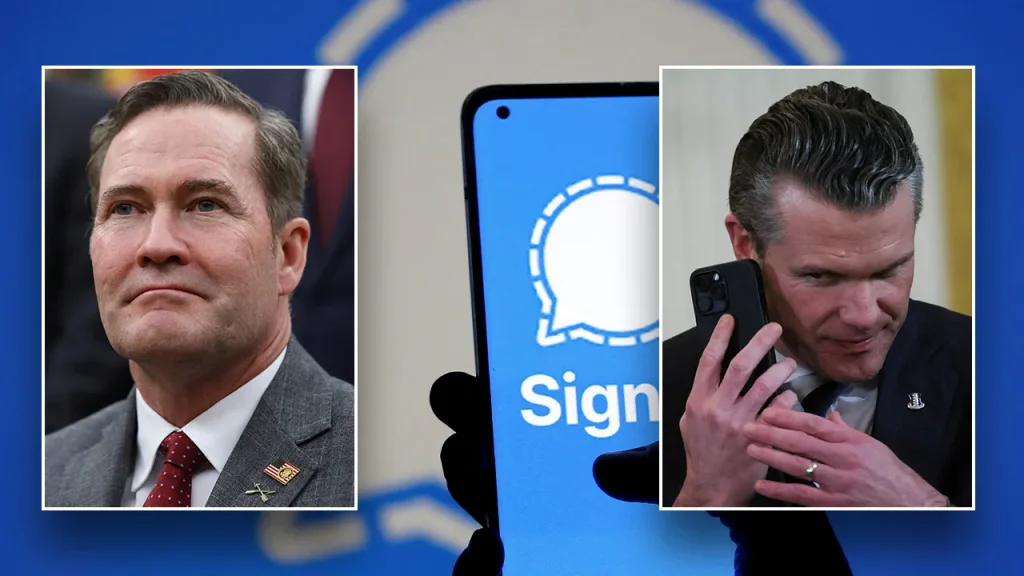In recent developments, the Trump administration has faced scrutiny over its reaction to an article published by The Atlantic. The article detailed a group chat involving national security leaders regarding a potential military response to threats in Yemen. However, officials have asserted that the piece misconstrued the discussion as a malicious fabrication, characterizing it as a “hoax” orchestrated by the publication. This response underscores the ongoing tensions between the administration and media narratives surrounding national security strategies.
| Article Subheadings |
|---|
| 1) Atlantic Article Sparks Controversy |
| 2) Administration’s Denial |
| 3) Impact on National Security Discourse |
| 4) Political Repercussions |
| 5) Broader Implications for Media Coverage |
Atlantic Article Sparks Controversy
The Atlantic published an article that purported to provide an inside look at a conversation among high-ranking national security officials about military operations in Yemen. Written by journalist Jeffrey Goldberg, the piece claimed that he was inadvertently invited to a group chat discussing sensitive plans aimed at counteracting threats from Houthi militants. The revelations in the article quickly caught the attention of both political analysts and critics, raising questions about the transparency and reliability of the information being discussed at such high levels of government. The article framed the discussion as a pivotal moment in shaping U.S. foreign policy, effectively positioning it against a backdrop of escalating tensions in the Middle East.
Administration’s Denial
In response to the publication of The Atlantic’s piece, officials from the Trump administration swiftly condemned the narrative. White House press secretary Karoline Leavitt took to social media to assert that the claims put forth by The Atlantic were misleading. Leavitt emphasized the absence of “war plans” in the discussions reported, describing the article as another instance of “sensationalist spin” designed to discredit the administration. National security advisor Mike Waltz reinforced this stance by stating unequivocally on social media that no specific locations, sources, or methods were discussed in the chat. His comments postulated that appropriate foreign partners were already informed about potential military actions, thus suggesting operational transparency rather than secrecy.
Impact on National Security Discourse
The fallout from this incident has significant implications for the discourse surrounding national security strategies in the United States. By framing the group chat as a clandestine operation, The Atlantic inadvertently drew attention to important questions about the communication channels within the government and their capacity for public oversight. Critics argue that when discussions of national security are sensationalized in the media, it can create an atmosphere of distrust between the public and government entities. This incident reflects a growing concern among policymakers and citizens alike regarding how critical military discussions are represented and interpreted. Moreover, it raises urgent questions about the ethics of journalistic practices in reporting sensitive information that could influence public opinion and policy.
Political Repercussions
This incident has not only stirred debate about media responsibility but also posed potential political repercussions for the Trump administration. As officials responded to The Atlantic’s article, it underscored the ongoing conflict between the administration and media outlets that have been critical of the government’s policies. Critics inside and outside of Congress have noted that if allegations stemming from this article are permitted to shape public perception, they may place further strain on the administration’s credibility. Political commentators have observed that these confrontations between leadership and media could affect the administration’s ability to effectively communicate its defense and foreign policy agendas moving forward.
Broader Implications for Media Coverage
The entire episode serves as a critical examination of how media outlets report on matters of national security and the potential ramifications of those narratives. This scenario emphasizes the need for accuracy and responsibility among journalists when dealing with sensitive topics, particularly military actions and governmental operations. It raises essential inquiries regarding the balance media outlets must strike between investigative journalism and the consequences of potentially misrepresenting facts. As divisions between political entities continue to deepen, the role of journalism in shaping public understanding of national security issues will likely come under increased scrutiny. Building trust in media, particularly in the realm of political reporting, remains a crucial challenge that must be addressed within the current landscape.
| No. | Key Points |
|---|---|
| 1 | The Atlantic’s article claimed insider access to a sensitive group chat among national security officials. |
| 2 | Administration officials decried the article as misleading, labeling it a “hoax.” |
| 3 | The controversy highlights potential vulnerabilities in the public’s trust regarding national security communications. |
| 4 | Political fallout from perceived media misrepresentation could complicate administration efforts to communicate its policies effectively. |
| 5 | The incident raises critical questions about journalistic responsibility and accuracy in reporting national security matters. |
Summary
The recent incident involving The Atlantic and the Trump administration underscores the fraught relationship between media portrayals of national security discussions and the potential political ramifications that can ensue. As government officials denounce perceived misrepresentations, the discourse surrounding national security becomes even more critical, delving into the motivations and methodologies of reporting on sensitive subjects. The need for responsible journalism is paramount, as inaccurate narratives can fracture trust and impact public perception of governance and military strategy.
Frequently Asked Questions
Question: What was the primary claim made by The Atlantic regarding the Trump administration’s group chat?
The Atlantic claimed to have insider access to a group chat where national security leaders discussed military operations in Yemen, framing it as a pivotal moment in U.S. foreign policy.
Question: How did Trump administration officials respond to the article?
Administration officials characterized the article as misleading and a “hoax,” insisting that it misrepresented the nature and content of the discussions taking place.
Question: What are potential implications of this controversy for future national security communications?
The controversy could complicate communication strategies for the administration, as it may hinder efforts to build trust and transparency with the public regarding national security matters.


